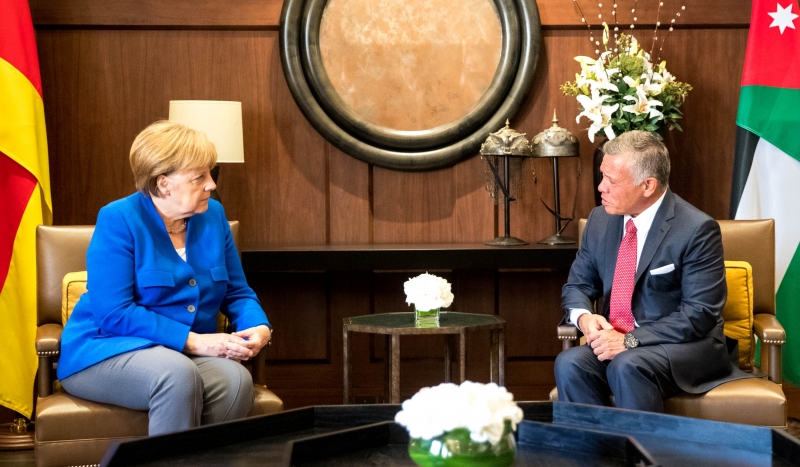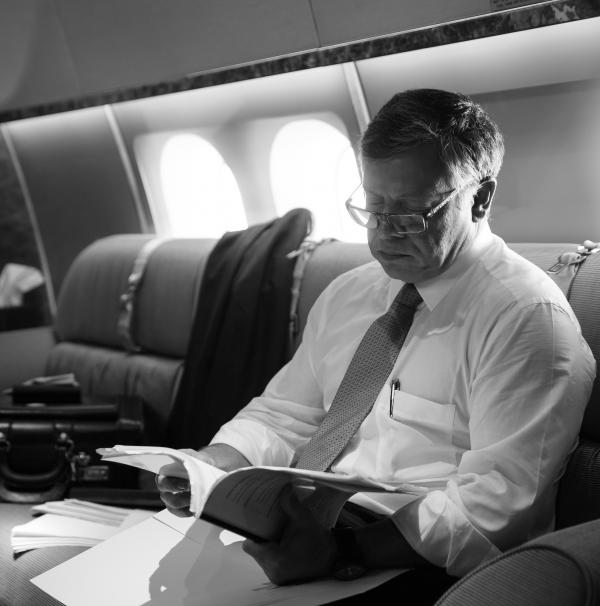King, German chancellor hold talks at Al Husseiniya Palace

His Majesty King Abdullah and German Chancellor Angela Merkel held talks at Al Husseiniya Palace on Thursday, covering the strategic partnership between Jordan and Germany, in addition to regional and international developments.
Following bilateral and expanded talks, which were attended by His Royal Highness Crown Prince Al Hussein bin Abdullah II and His Royal Highness Prince Feisal bin Al Hussein, King Abdullah and Chancellor Merkel delivered remarks to the press.
Welcoming the German chancellor, His Majesty noted that the visiting delegation includes German parliamentarians and business leaders, which “indicates the significance you attach to this visit, which we highly appreciate and welcome”.
“As we reviewed our bilateral ties, I was delighted to see how they have grown from strength to strength in the past few years,” the King added, pointing also to recent meetings this year with the German president and minister of defence.
“Jordan highly appreciates its close friendship with Germany and your country’s continued support for our development efforts, namely in our education and water sectors,” His Majesty told the chancellor.
“As the largest donor at the Brussels conference, Germany understands the great burden of the Syrian refugee crisis and is providing generous assistance to host countries such as Jordan,” the King added.
“As we work towards further enhancing our economic ties, the business leaders accompanying you today have the chance to explore the unique opportunities Jordan has to offer in terms of investments and human resources,” His Majesty said.
The King noted the huge potential to increase investment and trade by utilising the EU-Jordan Rules of Origin agreement. “We have long been working with Germany and the European Union to capitalise on this effort,” His Majesty added.
“On key regional files, we share a common view and understanding,” the King said, adding that Jordanian-German defence and security cooperation “has helped enhance the security of both our countries, but also throughout the wider region”.
“We also look to Germany, as a leader in the European Union and on the international stage, to support peace efforts in the Middle East,” His Majesty said.
“The Palestinian-Israeli conflict remains the region’s key issue, and Germany and the EU have a major role to play in advancing peace efforts, based on the two-state solution,” the King affirmed.
“There can be no peace nor stability in the region without a just and lasting solution that leads to the establishment of an independent Palestinian state with East Jerusalem as its capital, living side by side with Israel in peace and security,” His Majesty stressed.
“In Jerusalem, Jordan remains committed to upholding its role, as well as its responsibility as Custodian of Islamic and Christian holy sites,” the King noted.
“We also see eye to eye on the need for a political solution in Syria that guarantees the country’s territorial integrity and the unity of its people,” His Majesty said, adding that Jordan and Germany will continue to coordinate on various regional and international issues.
For her part, Chancellor Merkel thanked the King for the hospitality.
“I think our relations have intensified very much over the past few years,” she said.
“One of the clear illustrations of this exchange with our civic societies, is certainly, the German Jordanian University. And I was able to see what enthusiasm and also with what passion the students there pursue their education, their professional education, and it’s a good sign for Jordan,” the chancellor added.
“We are more than aware of the challenges you face both in security policy, but also as regards the development of your society,” she said.
“Today, I congratulated most warmly the new prime minister. We wish the best of success for him and his team of ministers in implementing the reforms. The IMF, as we all know, usually has a very ambitious concept of reforms, and trying to implement them, trying to push them through, is anything but easy,” Merkel said.
“We, ourselves, have decided that—apart from the cooperation that we already have, 384 million euros has been devoted to development cooperation and the professional education of young people—that we shall give an untied loan to the tune of $100 million to the government, in order to make it easier… to implement the IMF reforms,” she added.
“We, as I said, have a business delegation with us here today. We’ve said in our talks that the Jordanian side also wishes, and it longs for, cooperation in the business sector,” Merkel noted.
“I then said there should be a very close exchange, because… [Jordan] is, indeed, an attractive country, and our business community wishes to invest,” she told reporters.
“You face an even greater challenge, which has a lot to do with the war in Syria, and, obviously, great demands are made on your security policy and defence policy,” the chancellor continued, adding that Germany is “part of the small group as well that is trying to bring about a solution to the Syrian conflict”.
“We also get good and very sensible strategic advice from you about the players in the region,” she said.
“We know that we face the same challenges; the challenge that is fighting Daesh; it also means that we need to create a peaceful environment in Syria, a peace process that is. And let me highlight what Jordan is doing, simply by hosting this enormous number of refugees, more than 1 million people; more than 200,000 young children have to be given places in your schools, which, obviously, makes it very difficult here for your country to do that,” Merkel noted.
“We want to concentrate in our cooperation, obviously, on helping refugees, but not forgetting that the people who actually live in Jordan, Jordanian citizens, also wish to shape a good future and need a good future for themselves and their families,” she said.
“Jordan is unthinkable without mentioning the Middle East peace process. For many, many years, unfortunately, we have not seen progress there, but it is very much in Jordan’s vested interest,” Merkel added, stressing that “we are all aware of Jordan’s very important input into bringing about the solution.”
Chancellor Merkel added that Germany looks forward to further cooperation with Jordan in the future, while building on what has already been achieved.
She also referred to a number of regional issues, including the security challenges facing the two countries, as well as the nuclear agreement with Iran, and Iranian presence in some countries in the region, stressing the importance of addressing and resolving these issues.
Earlier, talks covered means to advance Jordanian-German cooperation in the economic, development, and defence fields.
Discussions also covered regional issues, with His Majesty reaffirming Jordan’s position on the Palestinian-Israeli conflict, which must be resolved on the basis on the two-state solution.
The King called on the international community to undertake its responsibilities in supporting UNRWA to ensure it maintains its vital services to refugees, thanking Germany for supporting the UN agency.
Discussions also covered the Syrian refugee crisis, and the importance of reaching a political solution in Syria and maintaining the de-escalation zone in southwestern Syria.
Senior officials on both sides attended the expanded talks.
His Majesty also hosted a luncheon in honour of Chancellor Merkel and the accompanying delegation, attended by Crown Prince Al Hussein and Prince Feisal.


